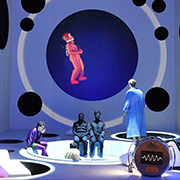A glimpse into the not-too-distant future: In their new opera "Singularity," composer Miroslav Srnka and author Tom Holloway dramatize mind games about computerized people, updates, and human and technical malfunctions. Their opera is a fast-paced play with set pieces of the cyber world, combining vision with farce and a glimpse into human abysses. Expressly composed for young voices, “Singularity” was written for the opera studio of the Bavarian State Opera in Munich. Nicolas Brieger signed responsible for the production of the premiere on 5 June 2021 in the Cuvilliés Theatre, the Klangforum Wien played under the baton of Patrick Hahn. The opera was performed both live and per live-stream. The live-stream is still accessible. "Singularity" is the third opera by Miroslav Srnka and Tom Holloway commissioned by the Bavarian State Opera, following “Make No Noise” and “South Pole”.
What if things were to turn really funny in space and with artificial intelligence in the near future? From the year 2045 onwards, some researchers conjecture that computer intelligence will overtake the thinking capacity of humans; they refer to this state as singularity. In the opera "Singularity" Miroslav Srnka and Tom Holloway combine this vision with a plot about the consequences for human coexistence. The events: the Internet has recently been implanted into the human body. People can communicate both with their voice and by connecting their brains. But after the last universal update, the first virus of the age spreads. A couple is also to be updated. She undertakes the update but he is too lazy to do it. Suddenly he sees that she has been infected and her thoughts and secrets are visible to all who have also been infected. The people without the update, however, are isolated in a space station for research purposes, with special consequences and a surprising outcome ...
How does one compose an opera set in the future and in space? what are the musical principles? Miroslav Srnka describes the essence of the story: "It is a piece about a division in our communication. This already exists today in the separation of our physical existence and our digital identity in the media such as chat and social media etc... At the same time "Singularity" is a composition for young voices, set for a complete ensemble with two sopranos, mezzos, tenors and baritones, in which each character is cast twice: once for the real, 'analogue' communication and once for the digital communication. The musical design then follows the idea of a future perception, when our digital communication will no longer take place through devices such as the smartphone, but through a direct link to a communication implant in our nervous system. And since it's a comedy, when the implants are updated, there's a virus followed by a digital quarantine."
In opera, the division into a digital and an analogue voice results in a special way of dealing with singing, speech and speech sound as Miroslav Srnka describes: "The voices demand all gradations from a full operatic voice through to all kinds of extended vocal techniques right up to a free vocal artistry and even a very short acting passage. Nevertheless everything is set up for young voices and their specific possibilities. We are extremely lucky with the casting through the incredibly good studio of the Bavarian State Opera. The flexibility, self-development and openness of everyone involved is breathtaking."
What is particularly important to Miroslav Srnka about this work? "When we came up with the concept of the virus and digital quarantine between 2018 and 2019, we had no idea how close this would be to our everyday experience today. It's striking how only in isolation we learn how lonely we actually are in the world of omnipresent exchange. Still, we went through with the concept of a comedy about these issues, even though I often doubted it. But laughter with tears - for which, after all, there is a widely misused emoji - can ultimately be the resolution of any tragedy."
In its treatment of very everyday communication, the subject matter also picks up on the small absurdities of living together: "It's a science fiction story, though I don't think it's absurd. On the contrary, it may very well soon be possible for us to be connected in exactly the way that futurologist and musical instrument inventor Ray Kurzweil described in a text accompanying our premiere. Both science fiction and comedy must be conveyed as seriously as a tragic story. They are perhaps even more difficult to realize. It is always astonishing to me how underestimated and disregarded these genres are, both in literature and in contemporary music.”
Marie Luise Maintz
(June 2021)



